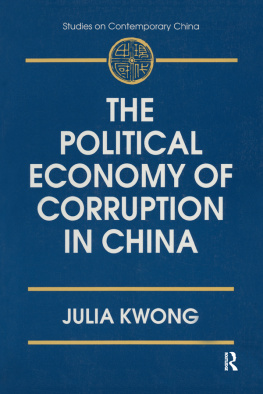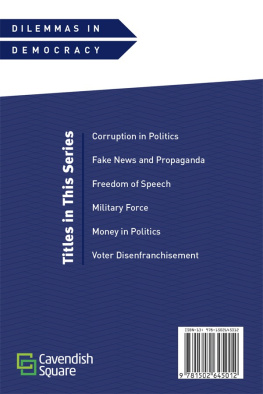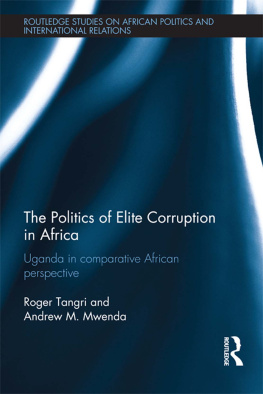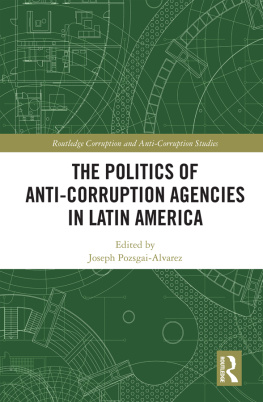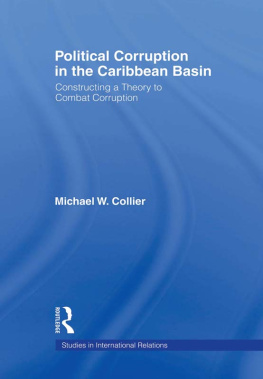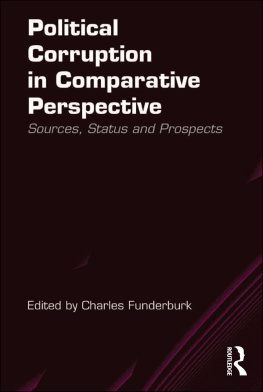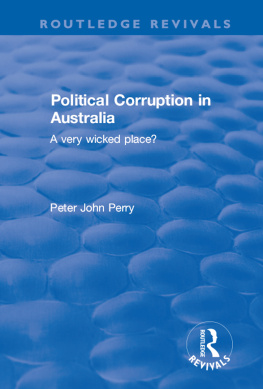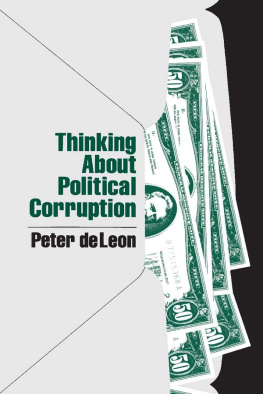THE POLITICAL ECONOMY OF CORRUPTION IN CHINA
Studies on Contemporary China
THE POLITICAL ECONOMY OF CHINAS SPECIAL ECONOMIC ZONES
George T. Crane
WORLDS APART
RECENT CHINESE WRITING AND ITS AUDIENCES
Howard Goldblatt, editor
CHINESE URBAN REFORM
WHAT MODEL NOW?
R Yin-Wang Kwok, William L Parish, and Anthony Gar-on Yeh with Xu Xuequang, editors
REBELLION AND FACTIONALISM IN A CHINESE PROVINCE
ZHEJIANG, 19661976
Keith Forster
POLITICS AT MAOS COURT
GAO GANG AND PARTY FACTIONALISM IN THE EARLY 1950s
Frederick C. Teiwes
MOLDING THE MEDIUM
THE CHINESE COMMUNIST PARTY AND THE LIBERATION DAILY
Patricia Stranahan
THE MAKING OF A SINO-MARXIST WORLD VIEW
PERCEPTIONS AND INTERPRETATIONS OF WORLD HISTORY IN THE PEOPLES REPUBLIC OF CHINA
Dorothea A.L Martin
POLITICS OF DISILLUSIONMENT
THE CHINESE COMMUNIST PARTY UNDER DENG XIAOPING, 19781989
Hsi-sheng Chi
CONQUERING RESOURCES
THE GROWTH AND DECLINE OF THE PLAS SCIENCE AND TECHNOLOGY COMMISSION FOR NATIONAL DEFENSE
Benjamin . Ostrov
THE PARADOX OF POWER IN A PEOPLES REPUBLIC OF CHINA MIDDLE SCHOOL
Martin Schoenhals
CHINAS ECONOMIC DILEMMAS IN THE 1990s
THE PROBLEMS OF REFORMS, MODERNIZATION, AND INDEPENDENCE
Edited by the Joint Economic Committee, Congress of the United States
CHINA IN THE ERA OF DENG XIAOPING
A DECADE OF REFORM
Michael Ying-mao Kau and Susan H. Marsh, editors
DOMESTIC LAW REFORMS IN POST- CHINA
Pitman B. Potter, editor
POLITICS AND PURGES IN CHINA
RECTIFICATION AND THE DECLINE OF PARTY NORMS, 19501965
Frederick . Teiwes
MORNING SUN
INTERVIEWS WITH POST-MAO CHINESE WRITERS
Laifong Leung
CHINESE FIRMS AND THE STATE IN TRANSITION
PROPERTY RIGHTS AND AGENCY PROBLEMS IN THE REFORM ERA
Keun Lee
THE MARKET MECHANISM AND ECONOMIC REFORMS IN CHINA
William A. Byrd
CHINA, THE UNITED STATES, AND THE SOVIET UNION
TRIPOLARITY AND POLICY-MAKING IN THE COLD WAR
Robert S. Ross, editor
AMERICAN STUDIES OF CONTEMPORARY CHINA
David Shambaugh, editor
CHINAS AUTOMOBILE INDUSTRY
POLICIES. PROBLEMS, AND PROSPECTS
Eric Harwit
DECISION-MAKING IN DENGS CHINA
PERSPECTIVES FROM INSIDERS
Carol Lee Hamrin and Suisheng Zhao, editors
PRIVATE BUSINESS AND ECONOMIC REFORM IN CHINA
Susan Young
MAKING URBAN REVOLUTION IN CHINA
THE CCP-GMD STRUGGLE FOR BEIPING-TIANJIN, 19451949
Joseph K. S. Yick
CHINAS ECONOMIC FUTURE
CHALLENGES TO U.S. POLICY
Joint Economic Committee, Congress of the United States
THE POLITICAL ECONOMY OF CORRUPTION IN CHINA
Julia Kwong
FAREWELL TO PEASANT CHINA
RURAL URBANIZATION AND SOCIAL CHANGES IN THE LATE TWENTIETH CENTURY
Gregory Eliyu Guldin, editor
PROVINCIAL STRATEGIES FOR ECONOMIC REFORM IN POST-MAO CHINA
Peter T. Y. Cheung, Jae Ho Chung, and Zhimin Lin, editors
An East Gate Book
First published 1997 by M.E. Sharpe
Published 2015 by Routledge
2 Park Square, Milton Park, Abingdon, Oxon OX14 4RN
711 Third Avenue, New York, NY 10017, USA
Routledge is an imprint of the Taylor & Francis Group, an informa business
Copyright 1997 Taylor & Francis. All rights reserved.
No part of this book may be reprinted or reproduced or utilised in any form or by any electronic, mechanical, or other means, now known or hereafter invented, including photocopying and recording, or in any information storage or retrieval system, without permission in writing from the publishers.
Notices
No responsibility is assumed by the publisher for any injury and/or damage to persons or property as a matter of products liability, negligence or otherwise, or from any use of operation of any methods, products, instructions or ideas contained in the material herein.
Practitioners and researchers must always rely on their own experience and knowledge in evaluating and using any information, methods, compounds, or experiments described herein. In using such information or methods they should be mindful of their own safety and the safety of others, including parties for whom they have a professional responsibility.
Product or corporate names may be trademarks or registered trademarks, and are used only for identification and explanation without intent to infringe.
Library of Congress Cataloging-in-Publication Data
Kwong, Julia.
The political economy of corruption in China / Julia Kwong.
p. cm.
An East Gate book.
Includes bibliographical references.
ISBN 0-7656-0086-2 (cloth : alk. paper).ISBN 0-7656-0087-0 (pbk : alk. paper)
1. Political corruptionChina. 2. ChinaPolitics and government1949
I. Title.
JQ1509.5.C6K961997
320.951dc21
97-13320
CIP
ISBN 13: 9780765600875 (pbk)
ISBN 13: 9780765600868 (hbk)
There were numerous reports in the Chinese and foreign press on the abuse of power by state officials at every level in the late seventies and eighties, but I had never experienced it personally on my many visits to China until 1989. On this trip, a Chinese friend who worked at a university secured me accommodation in a metropolitan center by giving the hotel manager a box of imported chocolate. On the same trip, I was offered the opportunity to make some money by buying a television set and other electrical appliances from the Friendship Store, a prerogative accorded to foreign visitors at the time; my contact would supply the buyers, and I would make about 300 yuan on each piece. During a discussion of collaborative research, an academic colleague suggested that his wife visit North America as one of the conditions.
These acts may not be clearcut manifestations of corruption but they are certainly inappropriate from a Western point of view. Such improprieties from fellow academics whom I had held in high regard over the years shocked me. True, they were looking after my interests and the means used were not necessarily illegal, but their actions were disturbing especially given the puritanical standards once held in Communist China, where cadres were criticized for eating a few peanuts owned by the state and were expected to sacrifice everything for the collective. If these academics, traditionally regarded as icons and custodians of morality in Chinese society, would so openly make such offers to make money and personal gains, I realized that perhaps corruption had become widespread and a regular part of Chinese life.
While this study on corruption stemmed from my personal encounters in the late eighties, my interest extends beyond understanding its proliferation in that particular period. Scholars, such as Jean Oi and Connie Squires Meaney, have examined corruption in rural and urban settings, and Alan P.L. Liu has analyzed reports in the

